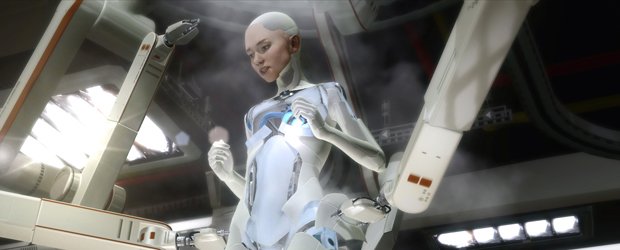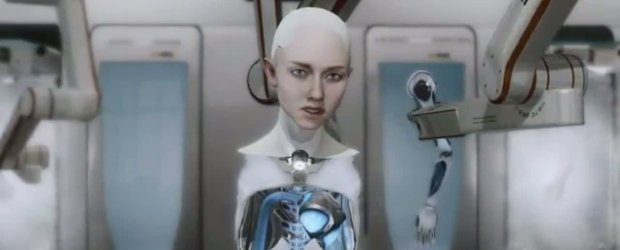Why David Cage's visually-amazing Kara demo sadly also sums up the worst of video game story-telling
Pretty robot, pretty poor omen for video game drama
More than that, it’s a cliche expressed in nothing but the most clumsy, lumpen, cheaply manipulative ways. We see Kara being assembled, so there’s an instant air of vulnerability and fragility about her. Her face has child-like proportions, a cynical old Disney trick for creating instant, quick-fix sympathy without bothering with any of that pesky characterisation stuff (and most shamelessly abused recently by James Cameron’s Avatar). Her bald countenance throughout the first half of the video only compounds the effect, as does her androgynously childlike hair when it does appear, not to mention her childlike, playful movements once free to move.
And the clumsily emphasised, desperately deliberate reference to her sexual functionality through both dialogue and repeated visual emphasis is naught but a tacky and slightly distasteful tying of her appearance’s inherent connotations of youthful innocence with an abstract concept of sexual servitude.

In terms of writing, the Kara demo is all about mercenary use of sensitive imagery and themes as little more than blunt cinematic short-hand for quick-fix results. By the time the sequence showing Kara’s unwilling conscious disassembly kicked in, I had lost all care for the characters or the story. All I could see was David Cage dressed as The Great Oz, standing behind his curtain and pulling his many levers in an attempt to manufacture some contrived simulation of human drama via as many mechanical conveniences as he could harness.
Yes, I have criticised Cage's narrative output before, but know that I am not simply bashing the man’s writing and directing for the sake of putting another boot in here. My main problem with the Kara demo is actually with how much unquestioning excitement there seems to be for it. Because regardless of Quantic Dream's presentation of this sort of stuff as the mature, dramatic evolution of video games, as soon as we as gamers and critics start to confuse simple visual realism for real dramatic gravitas, the campaign for better video game story-telling is screwed.
Yes, the performance capture stuff is convincing. Yes, Valorie Curry is a good actress, and plays the titular part well. But such things cannot and never will make up for hackneyed ideas, executed at the level of below-par TV. In fact the more photorealistic the execution becomes, the more glaring any substandard writing will be.

Above: This bit should have made me sad or angry. Instead it just made me face-palm. And that's partly because it's so technically well put together
And beyond all of that, there’s yet a bigger issue at play. As I see it, even the best-case future scenario springing from something like Kara is a pretty poor outlook for the maturation of gaming as medium. Should video games eventually get to the point of looking almost real, and should writing and direction indeed improve to the degree that the division between gaming and cinema is minimal, we will actually have achieved nothing. In fact we will have taken a step backwards. Because right now, games are evolving as a medium of their own, just as cinema did in its early days. They’re evolving their own unique mechanics, their own language, and their own ways of communicating both information and emotional meaning to their audience.
Weekly digests, tales from the communities you love, and more
There are a million different brand new ways that games can find – and indeed are already finding – to tell stories and evoke meaningful experiences. Just look at how powerfully affecting a game like Journey – a work without dialogue, cut-scene, or even a letter of in-game text – is, and on how many levels it speaks to the player through the language of its abstracted interactivity. If we simply ape cinema, we nip the burgeoning real art of games in the bud, and cement over its once fertile ground with the less-suitable, less versatile, concrete conventions of a very different, already-set medium.

Even if we “succeed” along the path of cinematic fidelity, we’ll have succeeded only in burning through several decades and a great deal of money in the aim of simulating something that has already existed for over a century.
I don’t know about you, but I see absolutely no point in that.



